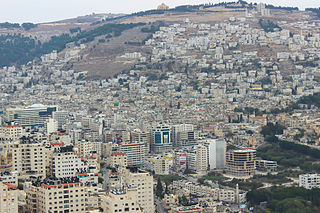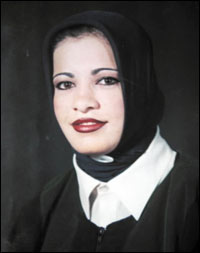Note: This compilation includes only those attacks that resulted in casualties. Attacks which did not kill or wound are not included.

Jenin is a city in the State of Palestine, in the Israeli-occupied West Bank. The city serves as the administrative center of the Jenin Governorate of Palestine and is a major center for the surrounding towns. Jenin came under Israeli occupation in 1967, and was put under the administration of the Palestinian National Authority as Area A of the West Bank in 1993.
This page is a partial listing of incidents of violence in the Israeli-Palestinian conflict in 2003.

Nablus is a Palestinian city in the West Bank, located approximately 49 kilometres (30 mi) north of Jerusalem, with a population of 156,906. Located between Mount Ebal and Mount Gerizim, it is the capital of the Nablus Governorate and a commercial and cultural centre of the State of Palestine, home to An-Najah National University, one of the largest Palestinian institutions of higher learning, and the Palestine Stock Exchange. Nablus is under the administration of the Palestinian National Authority (PNA).

Operation Defensive Shield was a 2002 Israeli military operation in the West Bank, carried out amidst the Second Intifada. Lasting for just over a month, it was the largest combat operation in the West Bank since the 1967 Arab–Israeli War, when Israel seized the territory from Jordan. Israel's stated goal for the escalation was to stop Palestinian terrorist attacks; the operation was launched two days after the Passover massacre, in which a Palestinian suicide bomber attacked the Park Hotel in Netanya, killing 30 civilians while injuring 140 more.

Hanadi Tayseer Abdul Malek Jaradat was a Palestinian from Jenin, who blew herself up on Saturday, 4 October 2003 in a suicide attack on Maxim restaurant, a Haifa restaurant co-owned by the same Jewish and Arab families for more than 40 years. She killed 21 Jewish and Arab Israelis, and injured 51 other people. Among the dead were four Israeli children, including a two-month old infant, and five Arabs. She had been recruited by Islamic Jihad.
This page is a partial listing of incidents of violence in the Israeli-Palestinian conflict in 2004.

The Maxim restaurant bombing was a suicide bombing which occurred on October 4, 2003, in the beachfront "Maxim" restaurant in Haifa, Israel. Twenty-one civilians were killed and 60 were injured. Among the victims were two families and four children, including a two-month-old baby.
As part of the Arab–Israeli conflict, especially during the Second Intifada from 2000 to 2005, Palestinian militant groups used children for suicide bombings. Minors were recruited to attack Israeli targets, both military and civilian. This deliberate involvement of children in armed conflict was condemned by international human rights organizations.
Hussam Muhammad Bilal Abdo is a Palestinian from the Masahiya area of Nablus, who, as a teenager, made international headlines on 24 March 2004, when he entered the Hawara Checkpoint in the West Bank, with eight kilos (18 lbs) of explosives strapped to his body as part of a suicide attack attempt.

Tulkarm or Tulkarem is a Palestinian city in the West Bank, the capital of the Tulkarm Governorate of the State of Palestine. The Israeli city of Netanya is to the west, and the Palestinian cities of Nablus and Jenin to the east. According to the Palestinian Central Bureau of Statistics, in 2017 Tulkarm had a population of 64,532. Tulkarm is under the administration of the Palestinian National Authority.

The districts and sub-districts of Mandatory Palestine formed the first and second levels of administrative division and existed through the whole era of Mandatory Palestine, namely from 1920 to 1948. The number and territorial extent of the districts varied over time, as did their subdivision into sub-districts.

The following outline is provided as an overview of and topical guide to the State of Palestine:

The Battle of Jenin, took place in the Jenin refugee camp in the West Bank on April 1–11, 2002. Israel Defense Forces (IDF) entered the camp, and other areas under the administration of the Palestinian Authority, during the Second Intifada, as part of Operation Defensive Shield. The Jenin camp was targeted after Israel reported that it had "served as a launch site for numerous terrorist attacks against both Israeli civilians and Israeli towns and villages in the area."
Events in the year 2002 in Israel.
Some families of Jews and Arabs killed in the Israeli-Arab conflict have chosen to donate organs to transplant patients on the "opposite side". Examples are Yoni Jesner, a 19-year-old student at Yeshivat Har Etzion in Gush Etzion, and Ahmed Khatib, a Palestinian boy shot by Israeli Defense Forces soldiers who mistook his toy gun for a real one. The generosity of families prepared to donate the organs of their loved ones under such circumstances has been praised. Their story was also made the subject of an award-winning BBC World Service program, Heart and Soul, in 2007.

The al-Aqsa Martyrs' Brigades is a coalition of Palestinian armed groups in the West Bank. The organization has been designated as a terrorist organization by Israel, the European Union, Canada, Japan, New Zealand, and the United States.
For millennia, the Greeks in Israel have been prominently present in the land. Greek expatriates comprise most of the leadership of the Eastern Greek Orthodox Church in Israel and the Palestinian Territories, in an arrangement that long predates the modern State of Israel.
Brooke Goldstein is a human rights attorney. She is the founder and Executive Director of The Lawfare Project.
The following is a list of events during the Israeli–Palestinian conflict in 2022.









